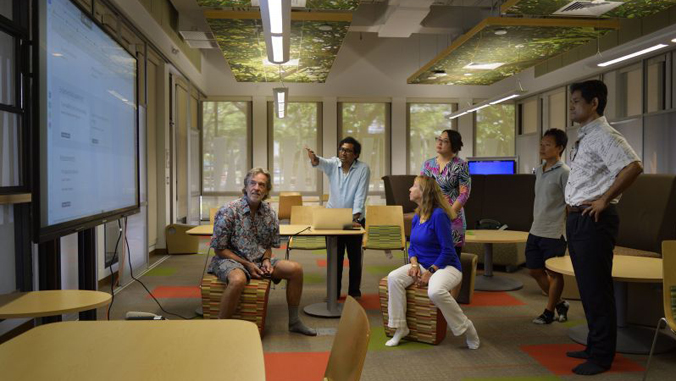
A new University of Hawaiʻi at Mānoa graduate education program that is designed to train the next generation of data scientists in a multitude of skill sets to benefit the state, nation and the world earned a five-year, $3 million boost from the National Science Foundation (NSF).
The NSF Research Traineeship award will allow a cross-disciplinary group of researchers to develop an innovative graduate program that brings together engineering, computer science, social science, business and medicine to harness the power of data science. According to the U.S. Bureau of Labor Statistics, the employment of data scientists is projected to grow 35% from 2022 to 2032, much faster than the average for all occupations.
Currently in a time of extraordinary technological progress, particularly in data science and artificial intelligence, economic and other challenges, including the COVID-19 pandemic, have delayed the benefits of this progress for a majority of the population. In our state, progress in data science has the potential to address critical needs in power, transportation, healthcare and communications. To benefit Hawaiʻi’s residents, however, technological progress must consider economic, business and social factors.
The new cross-disciplinary program plans to train a new generation of 61 graduate students, including 41 funded trainees. The program incorporates novel mechanisms such as tailored course modules to better prepare the trainees with the unique skills needed for bringing about an inclusive data revolution and equips them with a broader perspective on the interplay between areas traditionally treated disparately in a STEM graduate curriculum.
“The award is a culmination of efforts of many of my colleagues, including many not on this specific grant, to institutionalize novel research and education paradigms over several years,” said project Principal Investigator and Professor Narayana Santhanam from the Department of Electrical and Computer Engineering in the College of Engineering. “The grant will allow us to move in the direction of personalizing graduate instruction and allow students to see for themselves how seemingly different areas are interconnected. It will foster significantly closer research between different units and engage underrepresented groups in STEM, establishing long term mentoring structures that will persist beyond the life of the project.”
“Data science is becoming a core competency for many disciplines across UH Mānoa,” said project co-Principal Investigator and Professor Philip Johnson from the Information and Computer Sciences Department in the College of Natural Sciences. “This grant will allow us to explore novel ways to break down silos and facilitate multi-disciplinary research and education for our students.”
The students will work in teams on fundamental and applied data science research on the following topics:
- Decarbonization (reducing or eliminating carbon dioxide emissions) of the electricity and transportation sectors in Hawaiʻi using data from local stakeholders, utilities and the “living lab” that the UH Mānoa campus has become.
- In healthcare by leveraging the largest current pediatric electrocardiogram (records the electrical signal from the heart to check for different heart conditions) dataset to bring about novel diagnosis approaches, as well as through research that models epidemics.
- Next-generation wireless systems with enhanced communication, novel sensing, resiliency and efficiency.
“To solve pressing societal issues, we need to better understand and analyze human and social behavior backed by state-of-the-art data science,” said project co-Principal Investigator and Professor Nori Tarui of the Department of Economics in the College of Social Sciences. “With this grant, our interdisciplinary team of faculty members and students will work together with various partners toward practical, evidence-based solutions.”
The program will also create outreach activities for Native Hawaiians, women and members of the military to broaden participation in the STEM workforce.
“Traditional education programs have to consider the tradeoff between depth—how deep to cover concepts—and breadth—how many concepts and applications to cover,” said project co-Principal Investigator and Assistant Professor June Zhang from the Department of Electrical and Computer Engineering. “This grant will allow us to utilize novel educational tools like modules and knowledge bases to build a program that can offer students both depth and breadth in learning and research.”

